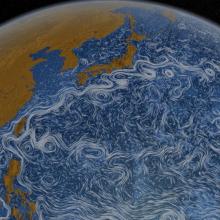Tackling climate change is growing in urgency and complexity. People around the globe are scrambling to mitigate and adapt to a warming planet. The People’s Republic of China, today the world’s largest emitter of CO2, came to be an active participant in global bodies of climate change governance over the last decade. What was at first an unexpected commitment is now once again charged with tense geopolitical shifts. Within China, citizens are experiencing the impact of the global crisis. The extreme heat in many parts of the country and its ensuing ecological, medical, and infrastructural emergencies in the summer of 2022 catapulted climate change into the public arena once again. Chinese scientists now openly warn that “China will be among the countries hardest hit by global warming” and that immediate and strong action is necessary.

Snapshot of the record-breaking heat wave of summer 2022.
Source: Scott Duncan, 13 July 2022, via Twitter @scottduncanwx, shared with generous permission. See more of his work on scottduncanwx.com.
Scientists at Chinese universities, research institutes, and other organizations are addressing a wide range of climate change related questions, from the mechanics of the earth system to local adaptation measures. They are active contributors to international research efforts as well as sought after experts in national and local governance within China. At the same time, they are in a complex position, working in an environment that apparently provides them with both abundant resources as much as it restricts their freedom of research. How scientists in China navigate their position while doing research on climate change, as well as the impact of their work, domestically and abroad, remains a broad yet understudied field. Who are the scientists, what do they focus on in their research? And does the political leadership and the populace in China actually “listen to the science” in ways different to other political contexts?
The working group Scientists, Politics, and Climate Change in China (SPCCC) brings together academics interested in understanding the evolution of climate change research in China, as well as the role of scientists and scientific expertise in how the climate crisis is publicly understood and politically responded to in China. Group members will conduct research inspired by approaches and concepts from a variety of disciplinary backgrounds. The following common questions that motivate this collective endeavour are as follows:
- How is climate change studied in China? In particular, what academic disciplines play a role (and interact) in assessing climate change, including its social, economic, and political ramifications? What topics and technologies (e.g., geo-engineering, genetic modification of seeds) are particularly promoted in China? What’s more, is research steered in these directions in ways different from other political and social contexts?
- What epistemic communities do scientists based in China belong to? For instance, in what ways are they linked to the international scientific community and to climate change governance at the global level? What role do overarching concepts such as the “Anthropocene,” or the more homegrown “ecological civilization,” play in climate change research and framing in China?
- How is scientific knowledge and expertise reflected in policymaking and the public understanding of climate change in China? Can Chinese climate governance be understood as particularly “scientific” or “technocratic”? And what forms of science communication activities, targeted public outreach, or even political activism can we observe among Chinese climate researchers?
SPCCC will organize extensive discussions on existing scholarship and facilitate individual as well as joint research and publication projects over the coming years. With this work, we wish to contribute to broader discussions around the interrelations of sciences and climate change and seek to integrate the case of China into global comparative research. We welcome new working group members at any time and are looking forward to many collaborative events in the coming years.






